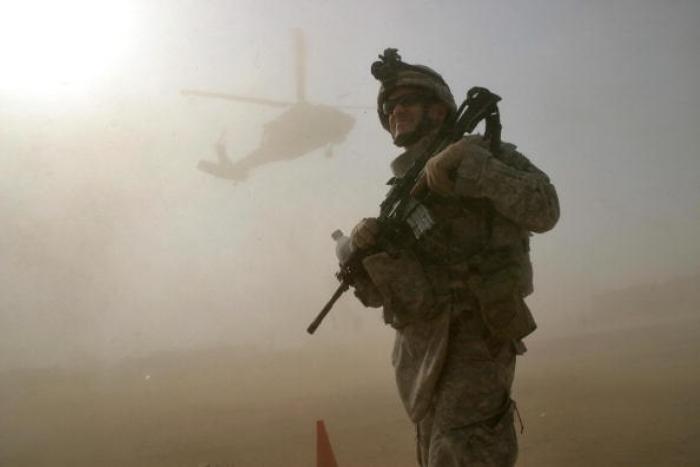
(CNSNews.com) – Hours after the U.S. military killed Qods Force commander Qassem Soleimani and a senior leader in the Iranian-backed Iraqi militia Kata’ib Hezbollah last week, Secretary of State Mike Pompeo announced the designation of another prominent Iraqi militia as a foreign terrorist organization.
In a move that received relatively little attention in the tumult following Soleimani’s death, Pompeo said he was designating Asaib Ahl al-Haq (AAH) as an FTO, and its leaders, Qais al-Khazali and his brother Laith al-Khazali, as specially designated global terrorists (SDGTs).
While Kata’ib Hezbollah (KH) has been a U.S.-designated FTO since 2009, up until now AAH, a close ally whose name means “League of the Righteous,” has evaded blacklisting.
That’s despite the fact that both AAH and KH stand accused of carrying out numerous deadly attacks against U.S. troops under Qods Force direction during the Iraq war.
“AAH and its leaders are violent proxies of the Islamic Republic of Iran,” Pompeo said Friday. “Acting on behalf of their masters in Tehran, they use violence and terror to further the Iranian regime’s efforts to undermine Iraqi sovereignty.”
Qais al-Khazali was one of four men Pompeo named in a tweet as orchestrators of last week’s attack on the U.S. Embassy compound in Baghdad.
The other three were Abu Mahdi al Muhandis – the KH leader killed with Soleimani – Hadi al-Amari and Faleh al-Fayyad. (More on the latter two below.)
The U.S. military implicated Khazali in a January 2007 Qods Force-supported assault and abduction in Karbala that cost the lives of five American soldiers.
Terrorists wearing U.S.-style fatigues attacked the Provincial Joint Coordination Center with hand grenades and gunfire, killing Pfc. Johnathon Millican, 20, of Trafford, Ala.
They then abducted Capt. Brian Freeman, 31, of Temecula, Calif., 1st Lieutenant. Jacob Fritz, 25, of Verdon, Neb., Spc. Jonathan Chism, 22, of Gonzales, La., and Pfc. Shawn Falter, 25, of Cortland, N.Y. Subsequently shot dead, their bodies were found in the attackers’ abandoned vehicles.
Two months later British special forces captured Khazali and his brother in Basra, along with another key suspect in the Karbala attack, Lebanese national and Hezbollah terrorist Ali Musa Daqduq.

Held for a time at Camp Cropper, a detention facility run by the U.S. Army near Baghdad Airport, Khazali was freed in January 2010, reportedly in exchange for the release of a British IT specialist who had been kidnapped by AAH at the Iraqi finance ministry two months after the Basra arrests.
(On the eve of the U.S. troop withdrawal in December 2011 the Obama administration controversially handed Daqduq over to the Iraqis, who released him less than a year later, saying there was insufficient evidence to continue holding him.)
After ISIS seized territory across Iraq in 2014, AAH, KH and other mostly Shi’ite militias formed the “Popular Mobilization Forces” (PMF) to help Iraqi government troops fight the Sunni jihadists.
On the back of that campaign, AAH and KH acquired significant political clout in Iraq, and in elections in 2018 their “Fatah” alliance won the second-biggest bloc in parliament.
Khazali has on occasion made threats against the ongoing U.S. troop presence in Iraq.
“O America take it as a warning or consider it a threat,” he tweeted in May 2018. “We are people who do not accept the presence of your troops on their land and you are delusional if you imagine that you can stay against the will of the Iraqi people. We will turn it into a dark night …”
Friday’s SDGT designation of Khazali and his brother took place under executive order 13224, a post-9/11 order designed to disrupt funding to terrorists, Americans are prohibited from doing business with SDGTs, and any assets they may have in the U.S. are frozen.
Friday’s action follows one last month, when the Khazali brothers were designated under a different executive order (E.O. 13818), for their involvement in serious human rights abuses, after AAH gunmen shot and killed Iraqi protestors demanding economic reforms and an end to Iran’s influence in Iraq.
‘Using a power drill to pierce the skulls of his adversaries’
The other two men identified in Pompeo’s tweet as key figures in the attack on the U.S. Embassy compound were Hadi al-Amari and Faleh al-Fayyad.
Amiri is leader of the Badr Organization, another Iran-created militia formerly known as the Badr Brigade, and also a member of the PMF.
A member of Iraq’s parliament and a former government minister, Amiri leads the “Fatah” alliance which also includes KH and AAH.

While transport minister he was part of a delegation led by then-Prime Minister Nouri al-Maliki during an Oval Office meeting with President Obama in December 2011.
Two years earlier, a classified diplomatic cable from the U.S. Embassy in Baghdad to Washington – later released by WikiLeaks – included some startling claims about Amiri.
“Sources indicate that he may have personally ordered attacks on up to 2,000 Sunnis,” the cable read. “One of his preferred methods of killing allegedly involved using a power drill to pierce the skulls of his adversaries.”
Fayyad, the fourth man named by Pompeo, is chairman of the PMF.
He also serves as Iraq’s national security advisor, and in that capacity met with Defense Secretary Mark Esper at the Pentagon last October.
In 2016 the Obama State Department played down concerns about the PMF, with then-spokesman John Kirby saying the “vast majority” of Shi’a militias fighting ISIS in Iraq have no connection with Iran or the IRGC.
“This idea that every Shi’a militia – or Popular Mobilization Force, that is another way they’re talked about – is controlled by Tehran and is therefore nefarious in nature, is just false,” Kirby said.
See also:
Pro-Iran Militia Leader in Iraq Warns Trump: Pull Out Troops or We’ll ‘Eject Them By Other Means’ (Dec. 27, 2018)
Iran-Backed Shi’ite Militia Leader Threatens to Attack US Troops If They Stay in Iraq (Feb. 14, 2018)
Go to Source
Author: Patrick Goodenough




